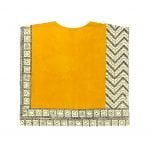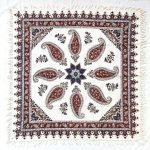Ghalamkari

Step into the world of Persian Ghalamkari, where tradition meets artistry in every intricate detail. At Persis Collection, we take pride in offering a curated selection of Ghalamkar textiles that capture the essence of Iranian block printing.
Understanding Ghalamkari: The Essence of Persian Block Printing
The Craft of Ghalamkari
Ghalamkari(Persian: “قلمکاری”, Pronounced: “Qah-lahm-kah-ree”, Meaning: “Calico Printing”) is the meticulous traditional art of applying intricate patterns onto fabric using hand-carved blocks. Originating in ancient Iran, this craft has evolved over centuries, transitioning from hand-painting to block printing. Artisans use specially designed wooden blocks to transfer patterns onto fabrics like cotton, silk, and linen, creating beautiful and culturally rich textiles.
The Role of Nature in Ghalamkari Designs
Many Ghalamkari designs are deeply inspired by nature, reflecting the beauty of Persian landscapes and flora. Common motifs include flowers, vines, and trees, which are often arranged in symmetrical patterns. These natural elements are not only decorative but also symbolic, representing themes of growth, life, and harmony. The use of natural dyes further connects Ghalamkari to the earth, with colors derived from plants, minerals, and other organic sources.
The Materials and Tools of Ghalamkari
The creation of Ghalamkari involves various materials, including natural dyes and high-quality fabrics. The blocks used in Persian block printing are carefully carved from wood, often using designs that reflect Persian art, history, and nature. The dyeing process incorporates natural substances like pomegranate peel and madder root, ensuring the vibrant and lasting colors for which Ghalamkari is known.
The Process of Carving Ghalamkari Blocks
Crafting the blocks used in Ghalamkari is an art form in itself. Skilled artisans carve intricate designs into blocks made from durable woods like pear or hawthorn. Each block corresponds to a different color or part of the pattern, requiring precise alignment during printing. The carving process is meticulous, with every detail carefully etched to ensure that the final print on the fabric is clear and accurate.
The Rich History of Persian Ghalamkari
Origins and Evolution of Ghalamkari
Ghalamkari has a deep history, with its roots stretching back over a thousand years. The art form flourished during the Safavid era, particularly in Isfahan, where it became a symbol of Persian cultural identity. The shift from hand-drawn designs to block printing allowed for greater production while maintaining the intricate beauty of each piece.
Ghalamkari in the Safavid Era
During the Safavid period, Ghalamkari reached its zenith. Isfahan, the capital of the Safavid Empire, was the heart of this artistic renaissance. The city’s workshops produced some of the most exquisite Ghalamkar fabrics, which were used by the nobility and even exported to other parts of the world. The designs from this era were often elaborate, featuring detailed floral patterns, geometric shapes, and scenes from Persian literature and mythology.
Ghalamkari in Modern Times
Today, Persian Ghalamkari remains a celebrated art form, especially in Isfahan, which continues to be a hub for its production. Modern artisans uphold traditional methods while incorporating contemporary elements, ensuring that Ghalamkar fabrics remain both culturally significant and relevant in today’s world.
The Global Influence of Ghalamkari
The influence of Ghalamkari extends beyond Iran, with its designs and techniques inspiring textile arts in other parts of the world. In particular, the intricate patterns and use of natural dyes have found parallels in Indian Kalamkari, a related art form that shares similar methods and aesthetics. The global appreciation for Ghalamkari reflects its timeless appeal and the universal beauty of Persian craftsmanship.
The Craftsmanship Behind Ghalamkari: Techniques and Materials
The Process of Creating Ghalamkari
The making of Ghalamkari involves several carefully executed steps, from preparing the fabric to applying the final design. Artisans first treat the fabric to remove impurities, then dye it using natural substances. The designs are printed using wooden blocks, each corresponding to a different color in the pattern. After printing, the fabric is washed and treated to set the colors.
The Dyeing Techniques in Ghalamkari
Dyeing is a crucial part of the Ghalamkari process, as it determines the vibrancy and durability of the colors. Traditional dyeing techniques involve the use of natural dyes, which are derived from plant materials like indigo, turmeric, and saffron. These dyes not only produce rich, deep colors but are also environmentally friendly, reflecting the sustainable practices of Persian artisans.
The Versatility of Ghalamkari Products
Ghalamkari is incredibly versatile, used to create a wide range of products from Ghalamkar tablecloths and bedspreads to scarves and wall hangings. Each item showcases the unique blend of tradition and artistry that defines Persian block printing. Whether used for decoration or daily use, Ghalamkari textiles bring a touch of Persian heritage into any setting.
Ghalamkari in Home Décor
In recent years, Ghalamkari has become increasingly popular in home décor. The intricate designs and vibrant colors of Ghalamkar textiles make them perfect for adding a touch of elegance to any space. Ghalamkar tablecloths are often used as statement pieces in dining rooms, while Ghalamkar curtains and bedspreads can transform a bedroom into a luxurious retreat. The versatility of Ghalamkari allows it to be seamlessly integrated into both traditional and modern interiors.
The Cultural Significance of Ghalamkari
Beyond its aesthetic appeal, Ghalamkari holds deep cultural significance in Iran. The patterns and motifs used in Ghalamkari often tell stories from Persian history, literature, and mythology. Owning a piece of Ghalamkari is not just about having a beautiful textile; it’s about connecting with a rich cultural heritage that has been passed down through generations.
Ghalamkari FAQ:
- What is Ghalamkari?
Ghalamkari is a traditional Persian art of printing or painting designs onto fabric using carved wooden stamps or blocks. - Where did Ghalamkari originate?
Ghalamkari originated in Iran, with its practice dating back to the 4th and 5th centuries AH, particularly flourishing in Isfahan. - What materials are used in Ghalamkari?
Ghalamkari typically uses fabrics like cotton, silk, and linen, with designs applied using natural dyes and wooden blocks. - What are the main types of Ghalamkari products?
Common Ghalamkari products include tablecloths, bedspreads, scarves, shawls, and decorative textiles. - How is Ghalamkari made?
Ghalamkari is made by soaking the fabric, dyeing it, and then using carved wooden stamps to apply the design, followed by color setting and finishing. - What makes Ghalamkari unique?
Ghalamkari is unique due to its intricate designs, cultural significance, and the use of natural dyes and traditional techniques. - Where can I buy authentic Persian Ghalamkari?
You can purchase authentic Persian Ghalamkari from trusted sources like Persis Collection, which offers a wide range of products with worldwide delivery. - How should I care for Ghalamkari textiles?
To care for Ghalamkari textiles, wash them gently by hand in cold water and avoid harsh detergents or direct sunlight to preserve the colors. - Is Ghalamkari still popular today?
Yes, Ghalamkari remains a popular and cherished art form in Iran, particularly in Isfahan, where it continues to be produced and sold. - What is the significance of Ghalamkari in Persian culture?
Ghalamkari holds cultural significance in Persian history, reflecting the rich artistic traditions and craftsmanship of Iran.







